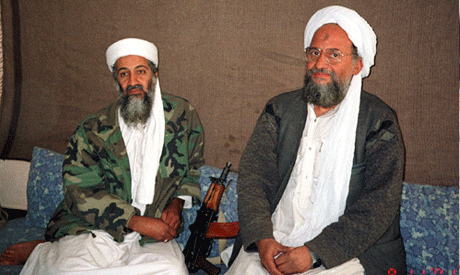
Osama bin Laden sits with his adviser and purported successor Ayman al-Zawahri, an Egyptian linked to the al Qaeda network (Photo: Reuters)
Many questions were raised upon the assassination of Al-Qaeda leader, Osama bin Laden Monday, almost 10 years after the notorious 11 September 2001 attacks on the World Trade Center and Pentagon in the US.
American officials said bin Laden, the mastermind of the 9/11 attacks, was found in a million-dollar compound in the upscale town of Abbottabad, 60km (35 miles) north of the Pakistani capital, Islamabad. A source familiar with the operation said bin Laden had been shot in the head.
Has the world become a safer place without bin Laden? Has his death heralded the end of the US war against terror? Will his allies seek revenge? Who succeed him? These questions are now frequently asked on an international scale.
Major General Adry Saied, strategic military analyst, believes Al-Qaeda and its affiliates will not be notably affected by the killing of the Saudi terrorist, thanks to Al-Qaeda’s deep-seated, long-established mindset.
“Al-Qaeda has branches in many countries in the Arab world and outside the Middle East, as well. Most of these smaller organisations’ members have never seen bin Laden or contacted him directly, but they apply the same strategy and have been after the same goals,” he told Ahram Online.
“Bin Laden was a figure who was killed, but Al-Qaeda’s mentality and targets remain. Therefore, I would say organised terrorism will be as pervasive as ever,” he concludes.
Second-in-command is Ayman Al-Zawahiri. “Al-Zawahiri is expected to take over now, unless he was injured in the attack on bin Laden. And, of course, the US will carry on fighting terrorism.
“Now the US-owed premises in Egypt and all over the world are targets. The US personally went after bin Laden because he was culpable for the September 11th attacks, so Al-Qaeda’s reply is, in turn, widely expected to be out of revenge.”
On how bin Laden’s death went down in Egypt, Saied said: “There are two kinds of people in the country, those who hate terrorism, and as such are against Al-Qaeda, and others who think of bin Laden as a hero who has pulled off what no one else could. The latter kind consist of anti-US people. Some of them, for instance, perceive the September 11th attacks to be a retaliation for Israel’s crimes against the Palestinians.”
Political analyst, Hossam Tamam, believes bin Laden would have been regarded as a martyr if it wasn’t for the recent revolutions that broke out in the Arab world, especially in Tunisia and Egypt.
“The revolts that erupted in many Arab countries of late made people look differently at Al-Qaeda and its operations,” he told Ahram Online.
“Those who started the revolutions in Tunisia and Egypt were peaceful young men but managed to topple their respective regimes, and afterwards got to be politically involved. Their ideology was completely different from Al-Qaeda's and they are definitely much more successful.
“In Egypt the protesters brought about upheaval, even though only less than 1000 of them were killed. Al-Qaeda might lose that number of its soldiers in a single operation and doesn’t get to change anything. People clearly see the difference. Six months ago, Bin Laden would have been deemed a martyr.
Tamam echoed Saied’s sentiments concerning the future of Al-Qaeda by saying: “Al-Zawahiri is now the shoe-in for the leading position in Al-Qaeda. He has been the actual leader of the organisation, bin Laden was just a charismatic figure.”
Short link: